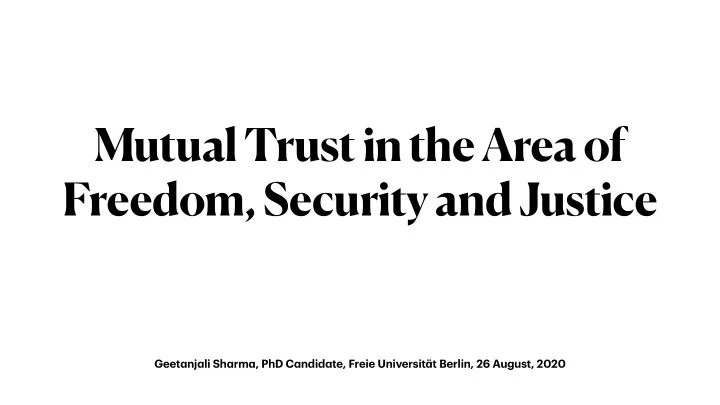

Mutual Trust in the Area of Freedom, Security and Justice Geet a nj a li Sh a rm a , PhD C a ndid a te, Freie Universit ä t Berlin, 26 August, 2020
Contents 1. Introduction, research question and methodology 2. Mutual trust in multilevel constitutional system of the EU A. Contours of mutual trust as limits to MS cooperation in the AFSJ B. Contextualising mutual trust in the multilevel EU constitutional system ( Thesis ) 3. Conclusion and Sources
1. 1 Introduction Context • Central pillar to the European Integration project. • Two negative obligations laid down in ECJ Opinion 2/13: 1. to not demand higher protection of fundamental rights than imposed by EU law 2. to not check if other MS have been complying with their obligations save in exceptional circumstances.
1.2 Introduction Rese a rch Question(s) • Therein the research question arises: • fi rstly, how is mutual trust to be de fi ned? As a dynamic value, how is the trust earning process to be comprehended legally? • secondly, how to solve the problem that its conception as an obligation to presume that MS are complying with EU fundamental rights leaves room for the possibility that actual violations may not be detected while also ensuring that the autonomous EU legal system still functions? • Methodology - doctrinal, dogmatic, multidisciplinary.
2.A. 1 Contours of mutual trust as limits to MS cooperation in the AFSJ Origins • Mutual recognition’s success as a tool of economic integration - ECJ case Cassis de Dijon. • Import into AFSJ: The (1999) Tampere European Council • Hereon, the mutual trust principle found its way into plethora of EU legislations and policy documents. • Soon enough it began to be cited as the rational for mutual recognition - It is because of mutual trust that MS recognise each other’s judicial decisions.
Recommend
More recommend